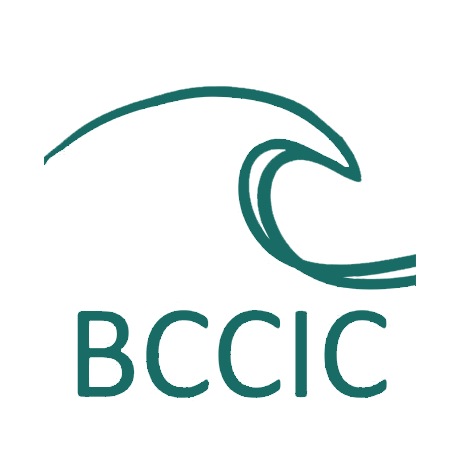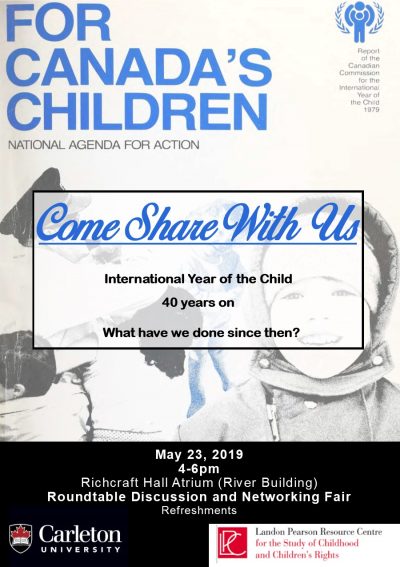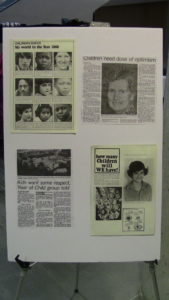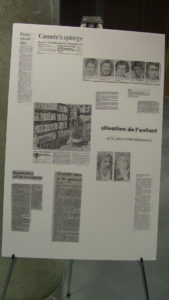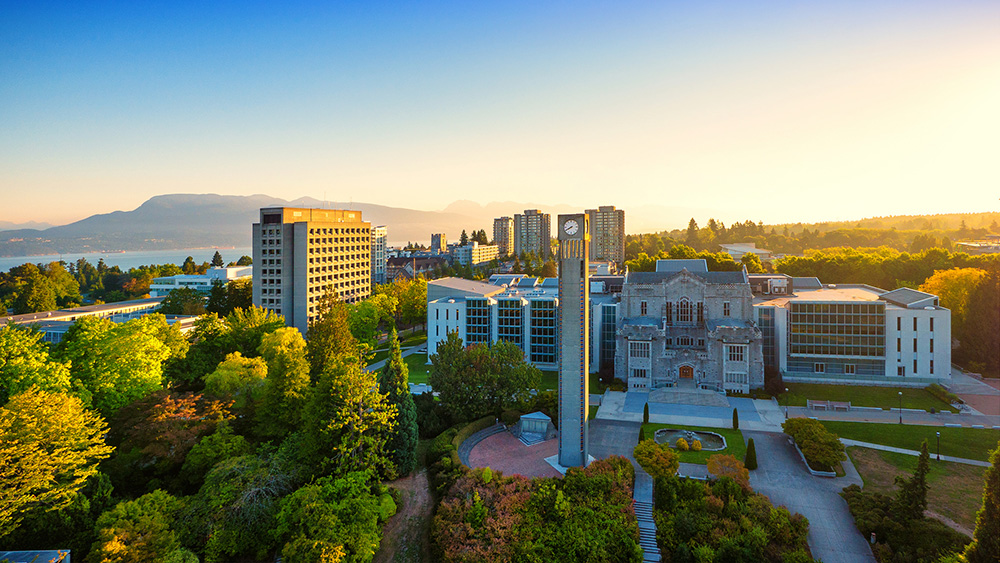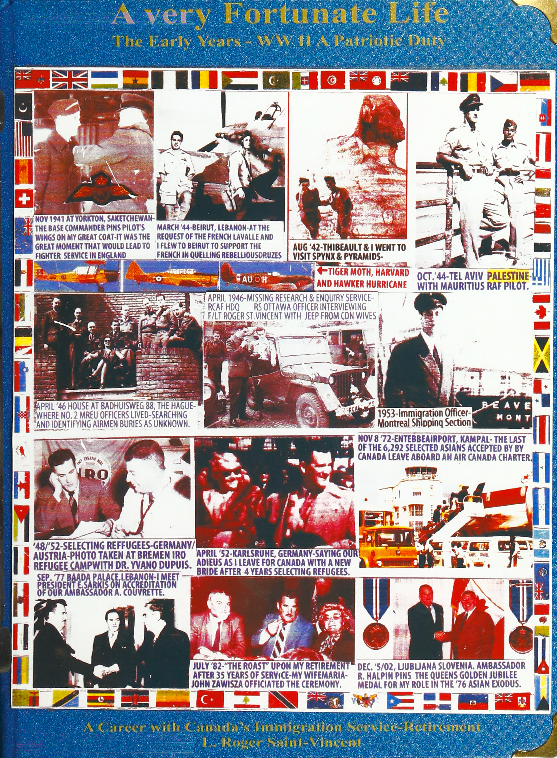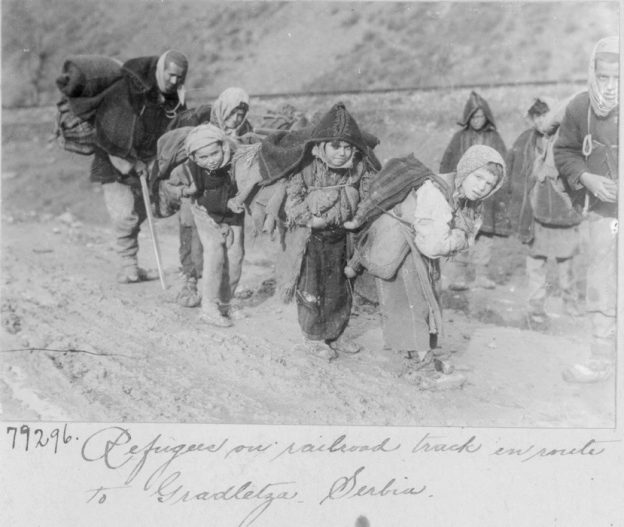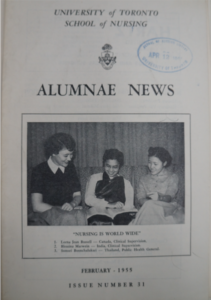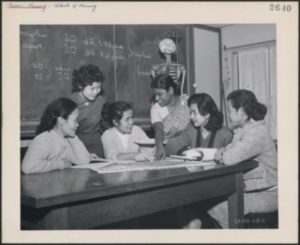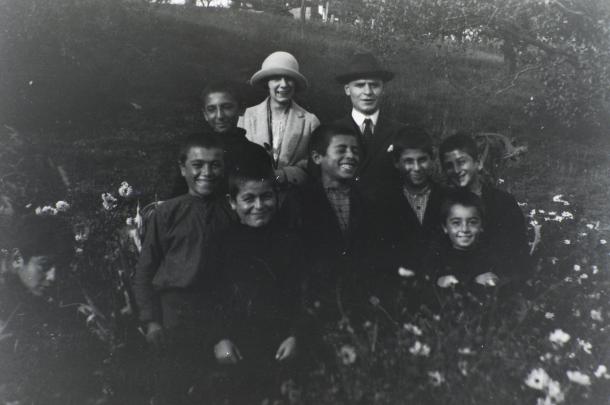CNHH members Jill Campbell-Miller and Kevin Brushett at the recent Annual General Meeting of the BCCIC. The following blog from BCCIC focuses on the presentation given by Dr. Campbell-Miller regarding the history of the BCCIC as an organization. Dr. Brushett’s presentation, not featured in the blog to follow, spoke about the history of international cooperation in Canada more generally. Continue reading
Category: Blog (Page 4 of 8)
By Sandrine Murray
- On the occasion of the celebrations of 40th anniversary of the Year of the Child, the Canadian Network on Humanitarian History used the archives of the Landon Pearson Resources Centre for the Study of Children and Children’s Rights (LPC) to prepare an exhibition on the report.
The United Nations proclaimed 1979 the International Year of the Child (IYC). Back then, television was the technology of the day, colour broadcasting introduced only a few years prior. No one could predict the arrival or impact of social media on children decades later. But how they viewed children’s rights at the time set a standard for today. Continue reading
by Lydia Wytenbroek
The Canadian Network of Humanitarian History (CNHH), an affiliate member of the Canadian Historical Association, held its sixth annual meeting and workshop on June 6, 2019 at UBC. The meeting offered an opportunity to reflect on network activities over the past year. CNHH members have furthered the study of the history of humanitarianism and development assistance through a range of exciting and innovative publications. Over the past year, more than a dozen original blog posts were published on the CNHH website on innovative topics pertaining to development aid and humanitarianism. Several CNHH members also contributed chapters to the open-access book, A Samaritan State Revisited: Historical Perspectives on Canadian Foreign Aid, published in 2019 by University of Calgary Press. As we reflected on the success of these posts and publications, we also discussed the need for a broader, comprehensive project that explores the history of Canadian development efforts. The opportunity to network, discuss the future of humanitarian history and consider future collaborative projects was a highlight of the meeting.
Continue readingby Mike Molloy
Produced 14 years ago, and printed in only a few dozen copies for friends and colleagues, the memoirs of one the main actors of Canada’s actions towards displaced persons between 1945 and 1980 is now available widely, thanks to the digitization services of the MacOdrum Library. His long time co-worker Mike Molloy reviews the book for a joint blog with the Canadian Immigration Historical Society; the illustrations come from his collection. Continue reading
Par Anne-Michèle Lajoie, étudiante stagiaire, Université Carleton
Image en vedette ci-dessus: 1. Kiosque des bénévoles: Prise au Sommet des Peuples à Québec avril 2001. C’est un sommet en parallèle avec le Sommet des chefs d’État. C’est la réponse populaire démocratique, internationaliste au processus de mondialisation structuré autour de celui des governments et des patrons. Cette photo démontre l’importance des bénévoles dans la mission d’Alternatives.
L’organisation montréalaise de solidarité internationale « Alternatives » aura 25 ans en novembre 2019 et l’organisation a le souhait de bâtir une mémoire, en faisant ressortir des moments clés de son histoire, en mettant la lumière sur des étapes de son évolution qui ont un intérêt historique au-delà du strict cadre institutionnel. Anne-Michèle Lajoie, étudiante en « Public Affairs and Policy Management » à Carleton, a passé les 13 jours de son « practicum » en histoire à les aider. Dans ce blog, elle raconte son expérience et réfléchit sur les liens entre les praticiens et les historiens de l’humanitaire. Continue reading
Sharing the Legacy of the Antigonish Movement: Conflicts between Local and International Development
by Peter Ludlow, PhD
In 1928, facing political marginalization, outmigration, rural abandonment, poverty in coastal communities, and social unrest in the colliery towns of Cape Breton Island, St. Francis Xavier University (St. F.X), the college of the Roman Catholic Diocese of Antigonish, Nova Scotia, organized an Extension Department. Uncertain of success, and with few financial resources, Extension launched a program of study clubs, cooperatives, and credit unions that would ultimately be celebrated globally as the “Antigonish Movement.” While clergymen like Monsignor (Msgr) Moses M. Coady (1882-1959) and Father (Fr) James J. Tompkins (1870-1953), garnered most of the period headlines, the Antigonish Movement was unquestionably a vehicle for the Catholic laity, and most especially women, to resolve their own economic problems and become “masters of their own destiny.” Continue reading

Assisting with the Researching of the Missionary Nursing at the West China Mission during World War II with I-CUREUS
A Mandarin-Speaking Undergraduate Student Becomes Research Assistant for Archival Work on Canadian Nursing during Wartime in China.
by Lui Xia Lee
Cross-posted with Trinity Western University.
These past eight months have been one of the most enlightening experiences of my university career. I was given an opportunity to be a Research Assistant for Dr. Sonya Grypma, Dean and Professor of Nursing at Trinity Western University in Langley, BC. Her current research project examines nursing during wartime in China and includes United Church of Canada missionary nurses (1937 to 1950). I was introduced to her by Dr. Marshall, who knew I wanted to do research in the history of China with my Mandarin language skills as well as an interest in research assistance work. This experience has taught me a lot about what it means to be a historian and the skills necessary to be one. This includes planning a trip to the United Church of Canada Archives, self-discipline, and digitizing material. Continue reading
Cross-Posted with ActiveHistory.ca
by Sonya de Laat
In the summer of 2018 an unprecedented number of people claiming to be refugees crossed into Canada at unofficial border points. Many Canadians learned of these events through photographs and other visual media circulating through the popular commercial press. Responding to such images, public reaction in Canada has been mixed. While some people support actions aimed at helping these families and individuals, others have sensationalized the situation by labelling it a “crisis” and calling border crossers as “illegals” or “cue jumpers.” Continue reading
By Sandrine Murray
- University of Toronto Archives
- Graduate nursing students at McGill, by David Bier (Library and Archives Canada)
Between 1950 and 1968, approximately 300 to 400 “trainees” from South and Southeast Asia — India, Pakistan and Ceylon (present-day Sri Lanka)– came to Canadian universities, learning from the country’s health education systems, and brought back their new knowledge to their home countries.
The Colombo Plan Fellowships are worth acknowledging in the grander tale of Canadian humanitarian aid, as Jill Campbell-Miller argued on Sept. 14, 2018. The historian, a member of the CNHH who also runs the network’s social media presence, gave a presentation to interested members of academia at Carleton University.
During her afternoon talk, Campbell-Miller presented the subtle racial and historical dimensions of the Colombo Plan Fellowships and the changing landscape of health education in Canada.The post-doctoral fellow’s talk was the basis for a paper she hopes to publish. Continue reading
Envisioning Gratitude: Armenian Orphans in Canada
by Sandrine Murray
The Armenian Genocide was the result of the Ottoman government’s destruction of 1.5 million Armenians, most of them citizens within the empire. This was during and after the First World War. Most academics place the beginning of the genocide in 1915, though there are various accounts of violence against the Christian minority in the Ottoman empire before then. The Armenian Genocide is often seen as the first modern genocide, though to this day the term has been rejected by Turkey to describe what happened. Continue reading

